Report: Analyzing Micro and Macro Factors in Business Context
VerifiedAdded on 2020/10/22
|7
|1608
|231
Report
AI Summary
This report delves into the multifaceted world of business, exploring the impact of both micro and macro factors on operational success. It begins by identifying key micro factors, such as suppliers, customers, and competitors, and how these elements directly influence a company's performance. The report then broadens its scope to examine macro factors, including the social, technological, political, economic, cultural, and environmental environments, emphasizing their profound effects on business sustainability and growth. The analysis underscores the importance of both individual and organizational strategies in effectively managing these factors. It highlights the need for adaptability, ethical practices, and a deep understanding of the global business landscape to achieve competitive advantages and ensure long-term viability. The conclusion reinforces the dynamic nature of business and the critical role of continuous improvement and strategic foresight in navigating the complexities of the modern market.
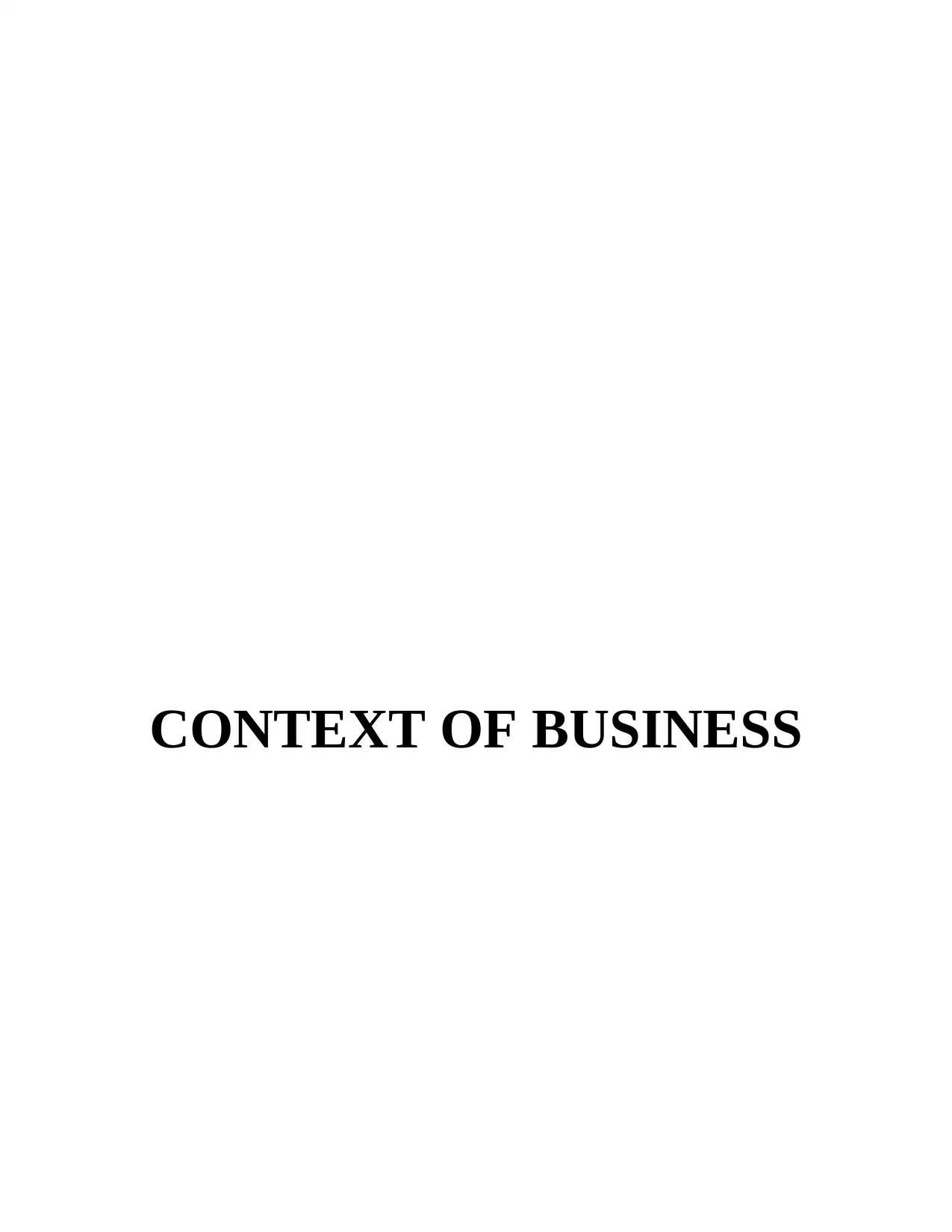
CONTEXT OF BUSINESS
Paraphrase This Document
Need a fresh take? Get an instant paraphrase of this document with our AI Paraphraser
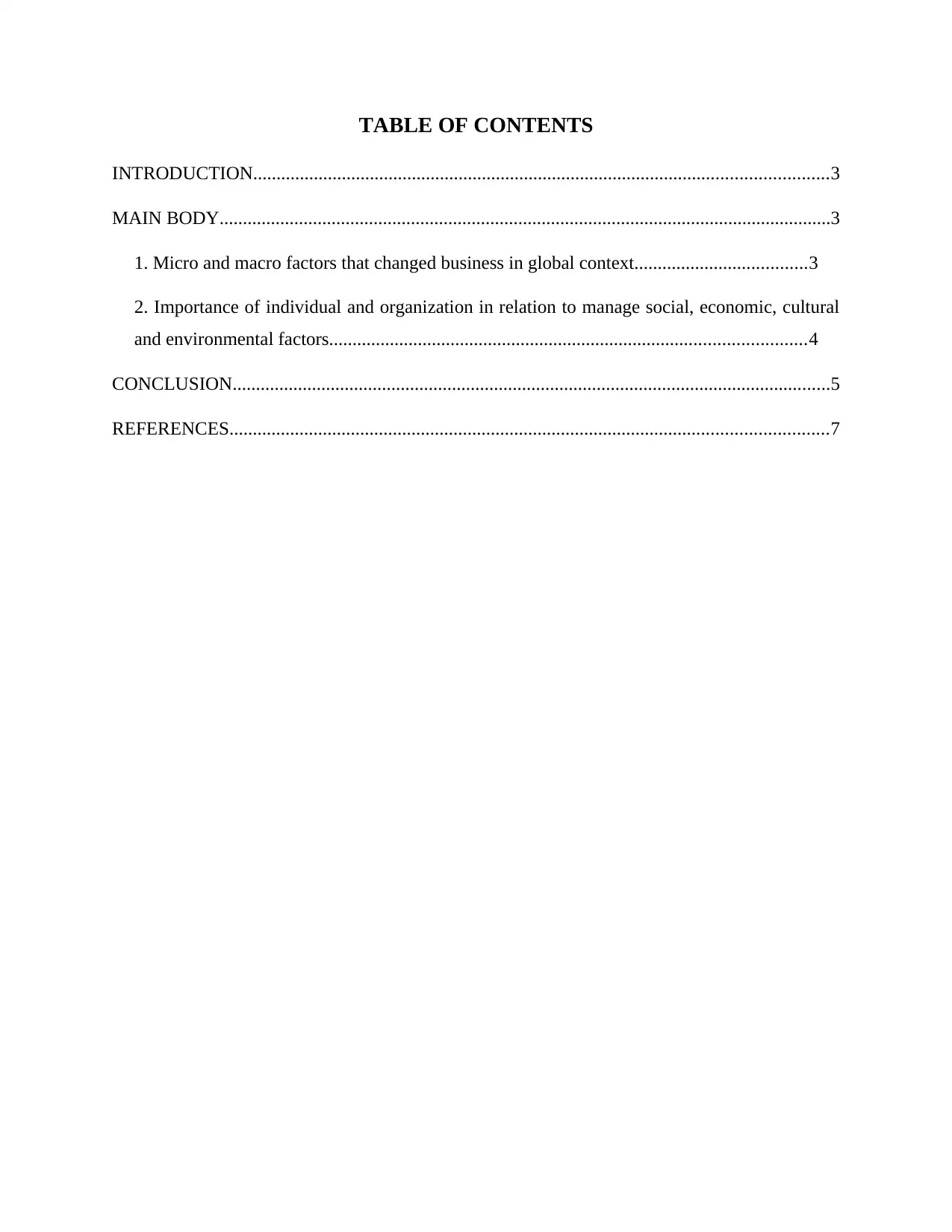
TABLE OF CONTENTS
INTRODUCTION...........................................................................................................................3
MAIN BODY...................................................................................................................................3
1. Micro and macro factors that changed business in global context.....................................3
2. Importance of individual and organization in relation to manage social, economic, cultural
and environmental factors......................................................................................................4
CONCLUSION................................................................................................................................5
REFERENCES................................................................................................................................7
INTRODUCTION...........................................................................................................................3
MAIN BODY...................................................................................................................................3
1. Micro and macro factors that changed business in global context.....................................3
2. Importance of individual and organization in relation to manage social, economic, cultural
and environmental factors......................................................................................................4
CONCLUSION................................................................................................................................5
REFERENCES................................................................................................................................7
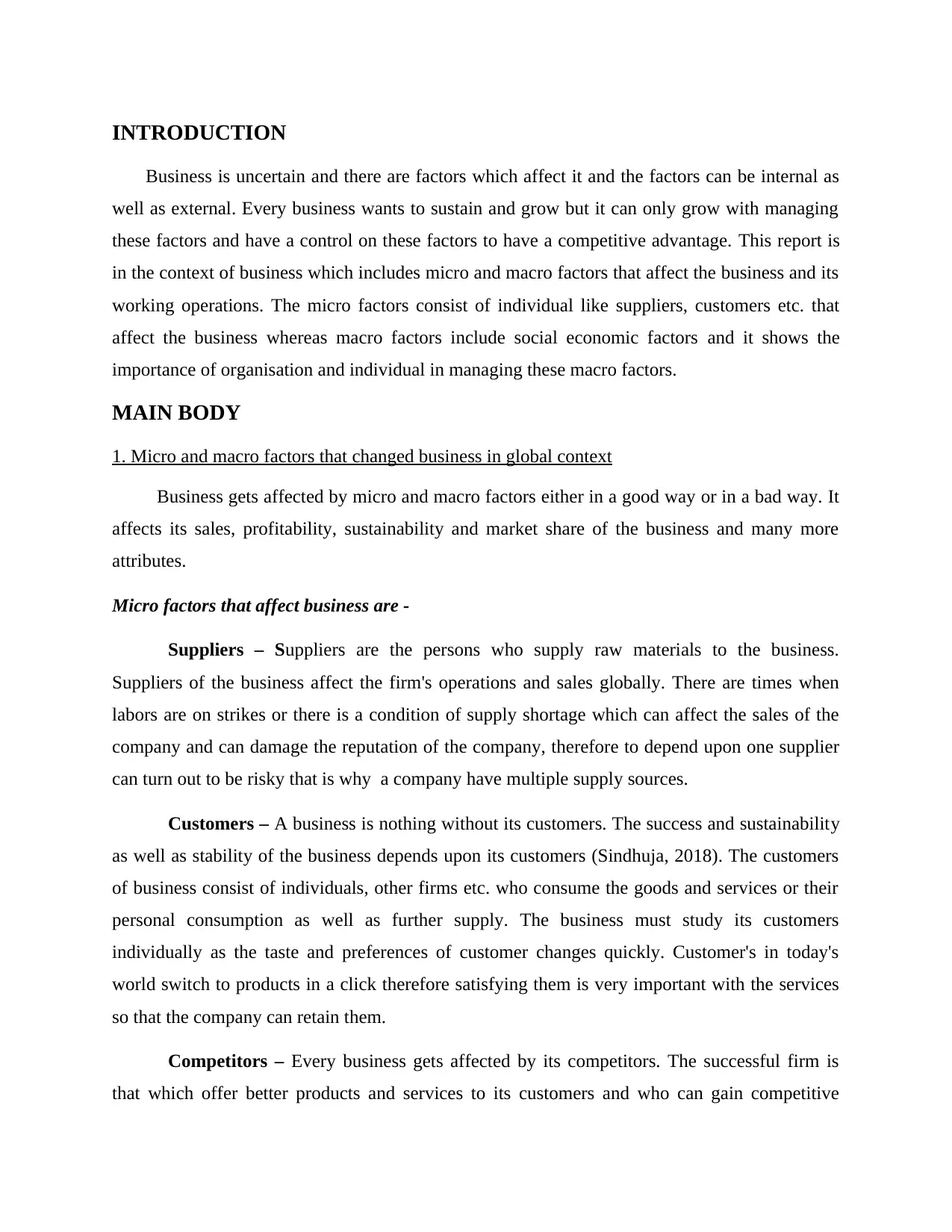
INTRODUCTION
Business is uncertain and there are factors which affect it and the factors can be internal as
well as external. Every business wants to sustain and grow but it can only grow with managing
these factors and have a control on these factors to have a competitive advantage. This report is
in the context of business which includes micro and macro factors that affect the business and its
working operations. The micro factors consist of individual like suppliers, customers etc. that
affect the business whereas macro factors include social economic factors and it shows the
importance of organisation and individual in managing these macro factors.
MAIN BODY
1. Micro and macro factors that changed business in global context
Business gets affected by micro and macro factors either in a good way or in a bad way. It
affects its sales, profitability, sustainability and market share of the business and many more
attributes.
Micro factors that affect business are -
Suppliers – Suppliers are the persons who supply raw materials to the business.
Suppliers of the business affect the firm's operations and sales globally. There are times when
labors are on strikes or there is a condition of supply shortage which can affect the sales of the
company and can damage the reputation of the company, therefore to depend upon one supplier
can turn out to be risky that is why a company have multiple supply sources.
Customers – A business is nothing without its customers. The success and sustainability
as well as stability of the business depends upon its customers (Sindhuja, 2018). The customers
of business consist of individuals, other firms etc. who consume the goods and services or their
personal consumption as well as further supply. The business must study its customers
individually as the taste and preferences of customer changes quickly. Customer's in today's
world switch to products in a click therefore satisfying them is very important with the services
so that the company can retain them.
Competitors – Every business gets affected by its competitors. The successful firm is
that which offer better products and services to its customers and who can gain competitive
Business is uncertain and there are factors which affect it and the factors can be internal as
well as external. Every business wants to sustain and grow but it can only grow with managing
these factors and have a control on these factors to have a competitive advantage. This report is
in the context of business which includes micro and macro factors that affect the business and its
working operations. The micro factors consist of individual like suppliers, customers etc. that
affect the business whereas macro factors include social economic factors and it shows the
importance of organisation and individual in managing these macro factors.
MAIN BODY
1. Micro and macro factors that changed business in global context
Business gets affected by micro and macro factors either in a good way or in a bad way. It
affects its sales, profitability, sustainability and market share of the business and many more
attributes.
Micro factors that affect business are -
Suppliers – Suppliers are the persons who supply raw materials to the business.
Suppliers of the business affect the firm's operations and sales globally. There are times when
labors are on strikes or there is a condition of supply shortage which can affect the sales of the
company and can damage the reputation of the company, therefore to depend upon one supplier
can turn out to be risky that is why a company have multiple supply sources.
Customers – A business is nothing without its customers. The success and sustainability
as well as stability of the business depends upon its customers (Sindhuja, 2018). The customers
of business consist of individuals, other firms etc. who consume the goods and services or their
personal consumption as well as further supply. The business must study its customers
individually as the taste and preferences of customer changes quickly. Customer's in today's
world switch to products in a click therefore satisfying them is very important with the services
so that the company can retain them.
Competitors – Every business gets affected by its competitors. The successful firm is
that which offer better products and services to its customers and who can gain competitive
⊘ This is a preview!⊘
Do you want full access?
Subscribe today to unlock all pages.

Trusted by 1+ million students worldwide
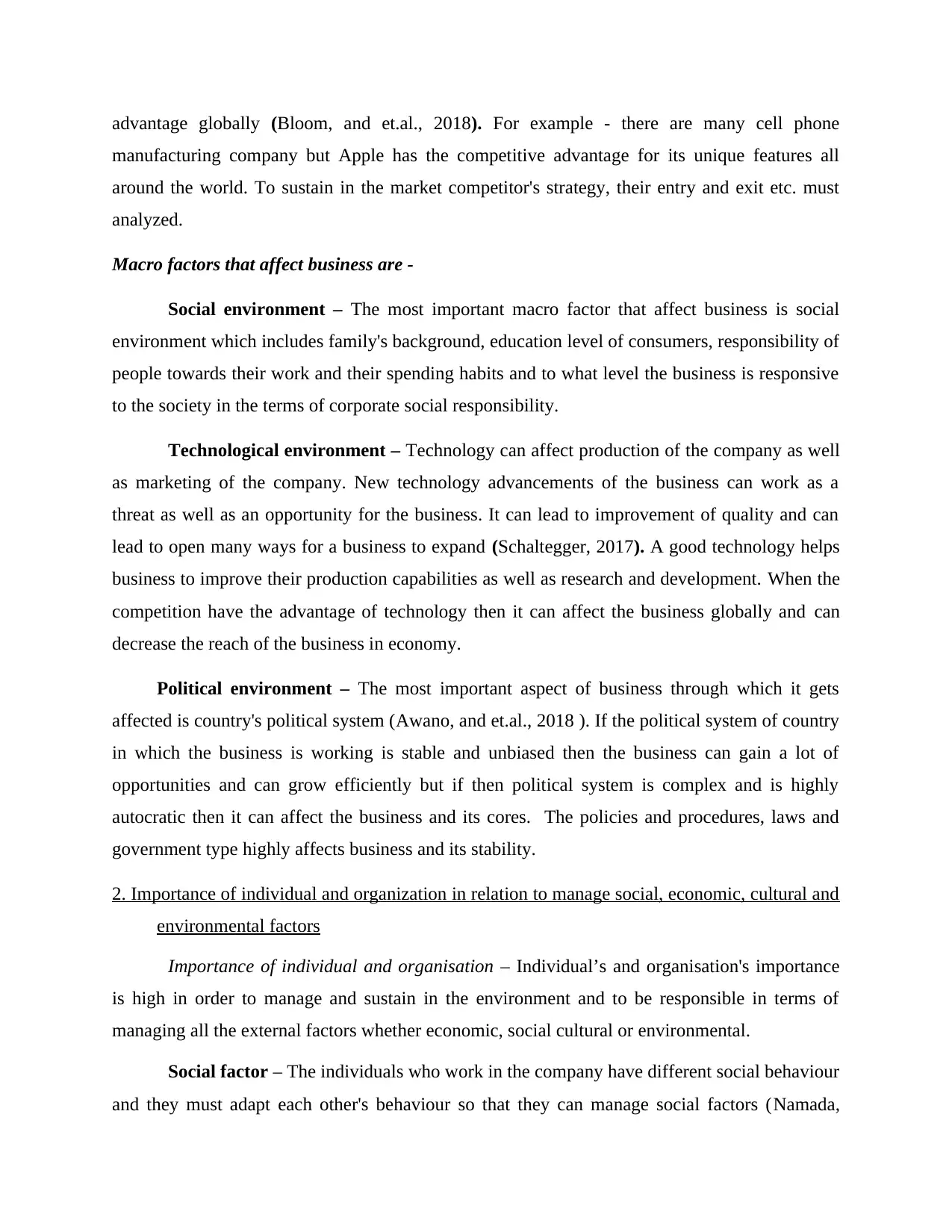
advantage globally (Bloom, and et.al., 2018). For example - there are many cell phone
manufacturing company but Apple has the competitive advantage for its unique features all
around the world. To sustain in the market competitor's strategy, their entry and exit etc. must
analyzed.
Macro factors that affect business are -
Social environment – The most important macro factor that affect business is social
environment which includes family's background, education level of consumers, responsibility of
people towards their work and their spending habits and to what level the business is responsive
to the society in the terms of corporate social responsibility.
Technological environment – Technology can affect production of the company as well
as marketing of the company. New technology advancements of the business can work as a
threat as well as an opportunity for the business. It can lead to improvement of quality and can
lead to open many ways for a business to expand (Schaltegger, 2017). A good technology helps
business to improve their production capabilities as well as research and development. When the
competition have the advantage of technology then it can affect the business globally and can
decrease the reach of the business in economy.
Political environment – The most important aspect of business through which it gets
affected is country's political system (Awano, and et.al., 2018 ). If the political system of country
in which the business is working is stable and unbiased then the business can gain a lot of
opportunities and can grow efficiently but if then political system is complex and is highly
autocratic then it can affect the business and its cores. The policies and procedures, laws and
government type highly affects business and its stability.
2. Importance of individual and organization in relation to manage social, economic, cultural and
environmental factors
Importance of individual and organisation – Individual’s and organisation's importance
is high in order to manage and sustain in the environment and to be responsible in terms of
managing all the external factors whether economic, social cultural or environmental.
Social factor – The individuals who work in the company have different social behaviour
and they must adapt each other's behaviour so that they can manage social factors (Namada,
manufacturing company but Apple has the competitive advantage for its unique features all
around the world. To sustain in the market competitor's strategy, their entry and exit etc. must
analyzed.
Macro factors that affect business are -
Social environment – The most important macro factor that affect business is social
environment which includes family's background, education level of consumers, responsibility of
people towards their work and their spending habits and to what level the business is responsive
to the society in the terms of corporate social responsibility.
Technological environment – Technology can affect production of the company as well
as marketing of the company. New technology advancements of the business can work as a
threat as well as an opportunity for the business. It can lead to improvement of quality and can
lead to open many ways for a business to expand (Schaltegger, 2017). A good technology helps
business to improve their production capabilities as well as research and development. When the
competition have the advantage of technology then it can affect the business globally and can
decrease the reach of the business in economy.
Political environment – The most important aspect of business through which it gets
affected is country's political system (Awano, and et.al., 2018 ). If the political system of country
in which the business is working is stable and unbiased then the business can gain a lot of
opportunities and can grow efficiently but if then political system is complex and is highly
autocratic then it can affect the business and its cores. The policies and procedures, laws and
government type highly affects business and its stability.
2. Importance of individual and organization in relation to manage social, economic, cultural and
environmental factors
Importance of individual and organisation – Individual’s and organisation's importance
is high in order to manage and sustain in the environment and to be responsible in terms of
managing all the external factors whether economic, social cultural or environmental.
Social factor – The individuals who work in the company have different social behaviour
and they must adapt each other's behaviour so that they can manage social factors (Namada,
Paraphrase This Document
Need a fresh take? Get an instant paraphrase of this document with our AI Paraphraser
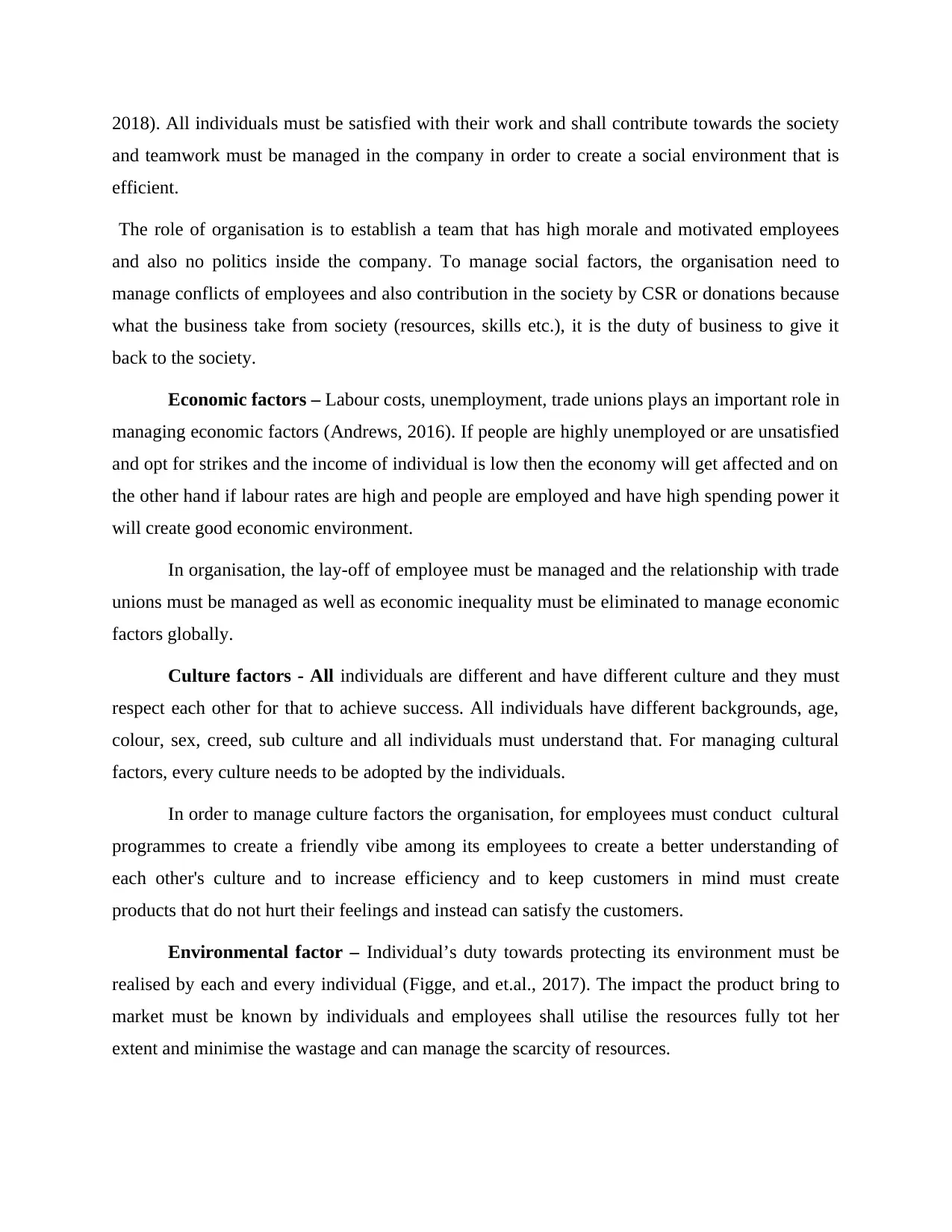
2018). All individuals must be satisfied with their work and shall contribute towards the society
and teamwork must be managed in the company in order to create a social environment that is
efficient.
The role of organisation is to establish a team that has high morale and motivated employees
and also no politics inside the company. To manage social factors, the organisation need to
manage conflicts of employees and also contribution in the society by CSR or donations because
what the business take from society (resources, skills etc.), it is the duty of business to give it
back to the society.
Economic factors – Labour costs, unemployment, trade unions plays an important role in
managing economic factors (Andrews, 2016). If people are highly unemployed or are unsatisfied
and opt for strikes and the income of individual is low then the economy will get affected and on
the other hand if labour rates are high and people are employed and have high spending power it
will create good economic environment.
In organisation, the lay-off of employee must be managed and the relationship with trade
unions must be managed as well as economic inequality must be eliminated to manage economic
factors globally.
Culture factors - All individuals are different and have different culture and they must
respect each other for that to achieve success. All individuals have different backgrounds, age,
colour, sex, creed, sub culture and all individuals must understand that. For managing cultural
factors, every culture needs to be adopted by the individuals.
In order to manage culture factors the organisation, for employees must conduct cultural
programmes to create a friendly vibe among its employees to create a better understanding of
each other's culture and to increase efficiency and to keep customers in mind must create
products that do not hurt their feelings and instead can satisfy the customers.
Environmental factor – Individual’s duty towards protecting its environment must be
realised by each and every individual (Figge, and et.al., 2017). The impact the product bring to
market must be known by individuals and employees shall utilise the resources fully tot her
extent and minimise the wastage and can manage the scarcity of resources.
and teamwork must be managed in the company in order to create a social environment that is
efficient.
The role of organisation is to establish a team that has high morale and motivated employees
and also no politics inside the company. To manage social factors, the organisation need to
manage conflicts of employees and also contribution in the society by CSR or donations because
what the business take from society (resources, skills etc.), it is the duty of business to give it
back to the society.
Economic factors – Labour costs, unemployment, trade unions plays an important role in
managing economic factors (Andrews, 2016). If people are highly unemployed or are unsatisfied
and opt for strikes and the income of individual is low then the economy will get affected and on
the other hand if labour rates are high and people are employed and have high spending power it
will create good economic environment.
In organisation, the lay-off of employee must be managed and the relationship with trade
unions must be managed as well as economic inequality must be eliminated to manage economic
factors globally.
Culture factors - All individuals are different and have different culture and they must
respect each other for that to achieve success. All individuals have different backgrounds, age,
colour, sex, creed, sub culture and all individuals must understand that. For managing cultural
factors, every culture needs to be adopted by the individuals.
In order to manage culture factors the organisation, for employees must conduct cultural
programmes to create a friendly vibe among its employees to create a better understanding of
each other's culture and to increase efficiency and to keep customers in mind must create
products that do not hurt their feelings and instead can satisfy the customers.
Environmental factor – Individual’s duty towards protecting its environment must be
realised by each and every individual (Figge, and et.al., 2017). The impact the product bring to
market must be known by individuals and employees shall utilise the resources fully tot her
extent and minimise the wastage and can manage the scarcity of resources.
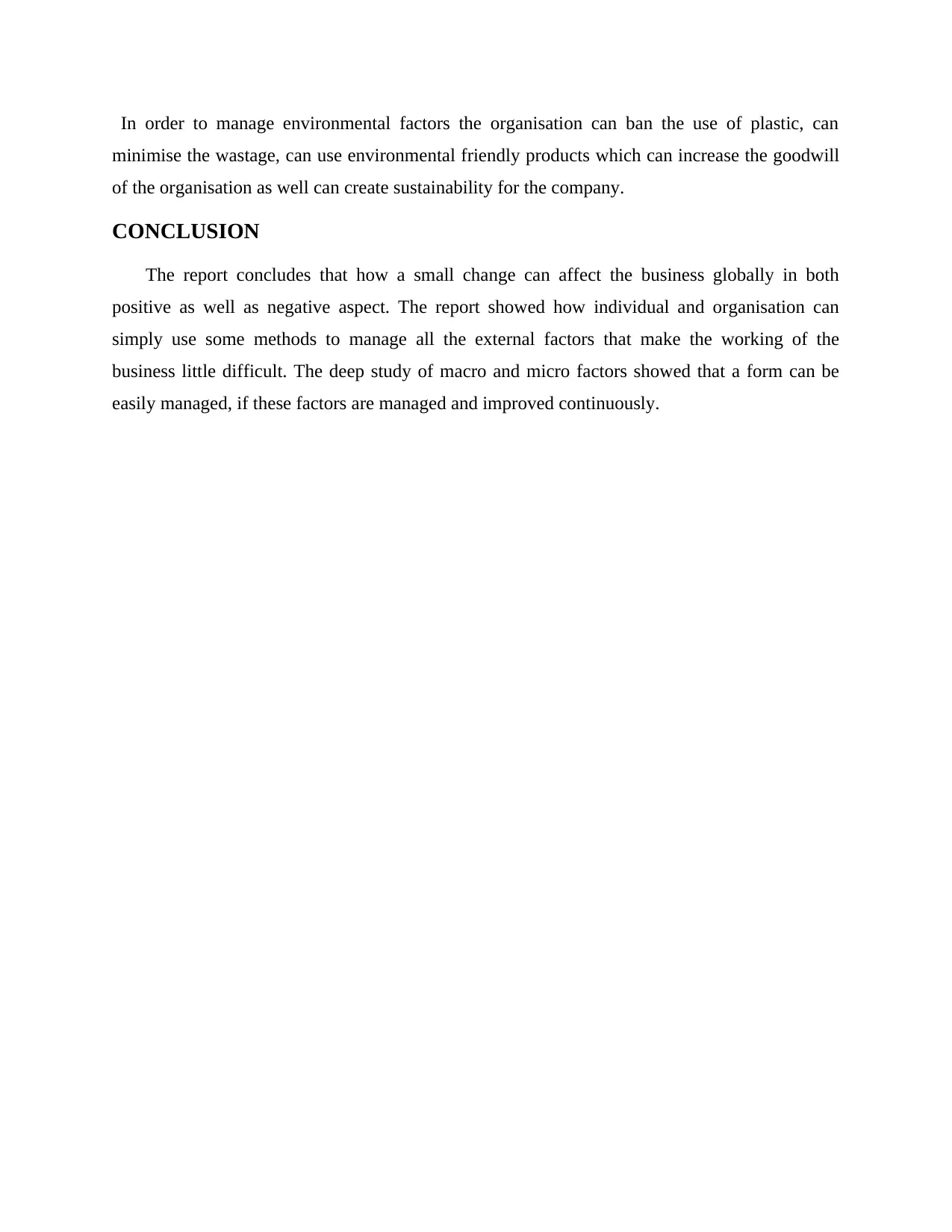
In order to manage environmental factors the organisation can ban the use of plastic, can
minimise the wastage, can use environmental friendly products which can increase the goodwill
of the organisation as well can create sustainability for the company.
CONCLUSION
The report concludes that how a small change can affect the business globally in both
positive as well as negative aspect. The report showed how individual and organisation can
simply use some methods to manage all the external factors that make the working of the
business little difficult. The deep study of macro and micro factors showed that a form can be
easily managed, if these factors are managed and improved continuously.
minimise the wastage, can use environmental friendly products which can increase the goodwill
of the organisation as well can create sustainability for the company.
CONCLUSION
The report concludes that how a small change can affect the business globally in both
positive as well as negative aspect. The report showed how individual and organisation can
simply use some methods to manage all the external factors that make the working of the
business little difficult. The deep study of macro and micro factors showed that a form can be
easily managed, if these factors are managed and improved continuously.
⊘ This is a preview!⊘
Do you want full access?
Subscribe today to unlock all pages.

Trusted by 1+ million students worldwide
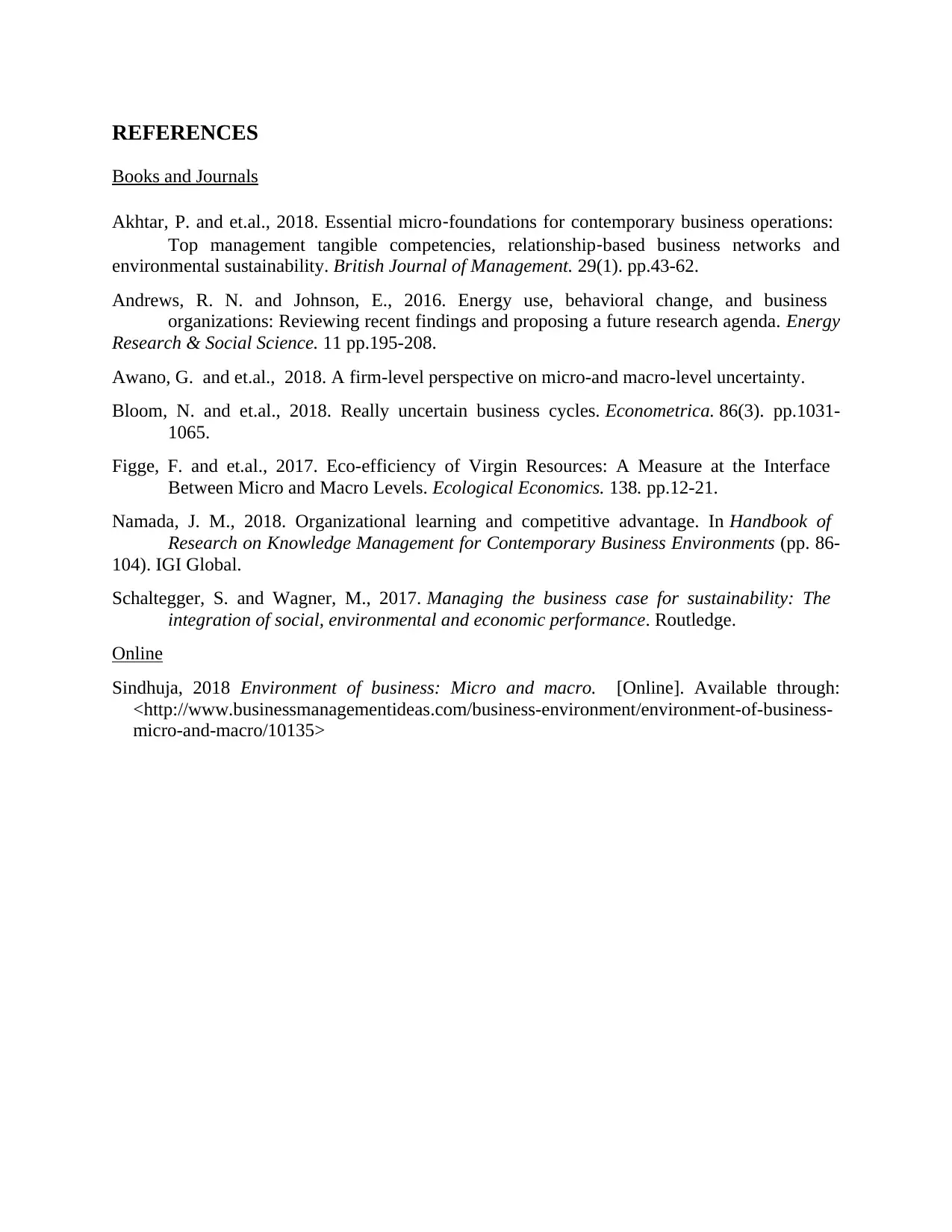
REFERENCES
Books and Journals
Akhtar, P. and et.al., 2018. Essential micro‐foundations for contemporary business operations:
Top management tangible competencies, relationship‐based business networks and
environmental sustainability. British Journal of Management. 29(1). pp.43-62.
Andrews, R. N. and Johnson, E., 2016. Energy use, behavioral change, and business
organizations: Reviewing recent findings and proposing a future research agenda. Energy
Research & Social Science. 11 pp.195-208.
Awano, G. and et.al., 2018. A firm-level perspective on micro-and macro-level uncertainty.
Bloom, N. and et.al., 2018. Really uncertain business cycles. Econometrica. 86(3). pp.1031-
1065.
Figge, F. and et.al., 2017. Eco-efficiency of Virgin Resources: A Measure at the Interface
Between Micro and Macro Levels. Ecological Economics. 138. pp.12-21.
Namada, J. M., 2018. Organizational learning and competitive advantage. In Handbook of
Research on Knowledge Management for Contemporary Business Environments (pp. 86-
104). IGI Global.
Schaltegger, S. and Wagner, M., 2017. Managing the business case for sustainability: The
integration of social, environmental and economic performance. Routledge.
Online
Sindhuja, 2018 Environment of business: Micro and macro. [Online]. Available through:
<http://www.businessmanagementideas.com/business-environment/environment-of-business-
micro-and-macro/10135>
Books and Journals
Akhtar, P. and et.al., 2018. Essential micro‐foundations for contemporary business operations:
Top management tangible competencies, relationship‐based business networks and
environmental sustainability. British Journal of Management. 29(1). pp.43-62.
Andrews, R. N. and Johnson, E., 2016. Energy use, behavioral change, and business
organizations: Reviewing recent findings and proposing a future research agenda. Energy
Research & Social Science. 11 pp.195-208.
Awano, G. and et.al., 2018. A firm-level perspective on micro-and macro-level uncertainty.
Bloom, N. and et.al., 2018. Really uncertain business cycles. Econometrica. 86(3). pp.1031-
1065.
Figge, F. and et.al., 2017. Eco-efficiency of Virgin Resources: A Measure at the Interface
Between Micro and Macro Levels. Ecological Economics. 138. pp.12-21.
Namada, J. M., 2018. Organizational learning and competitive advantage. In Handbook of
Research on Knowledge Management for Contemporary Business Environments (pp. 86-
104). IGI Global.
Schaltegger, S. and Wagner, M., 2017. Managing the business case for sustainability: The
integration of social, environmental and economic performance. Routledge.
Online
Sindhuja, 2018 Environment of business: Micro and macro. [Online]. Available through:
<http://www.businessmanagementideas.com/business-environment/environment-of-business-
micro-and-macro/10135>
1 out of 7
Related Documents
Your All-in-One AI-Powered Toolkit for Academic Success.
+13062052269
info@desklib.com
Available 24*7 on WhatsApp / Email
![[object Object]](/_next/static/media/star-bottom.7253800d.svg)
Unlock your academic potential
Copyright © 2020–2026 A2Z Services. All Rights Reserved. Developed and managed by ZUCOL.





